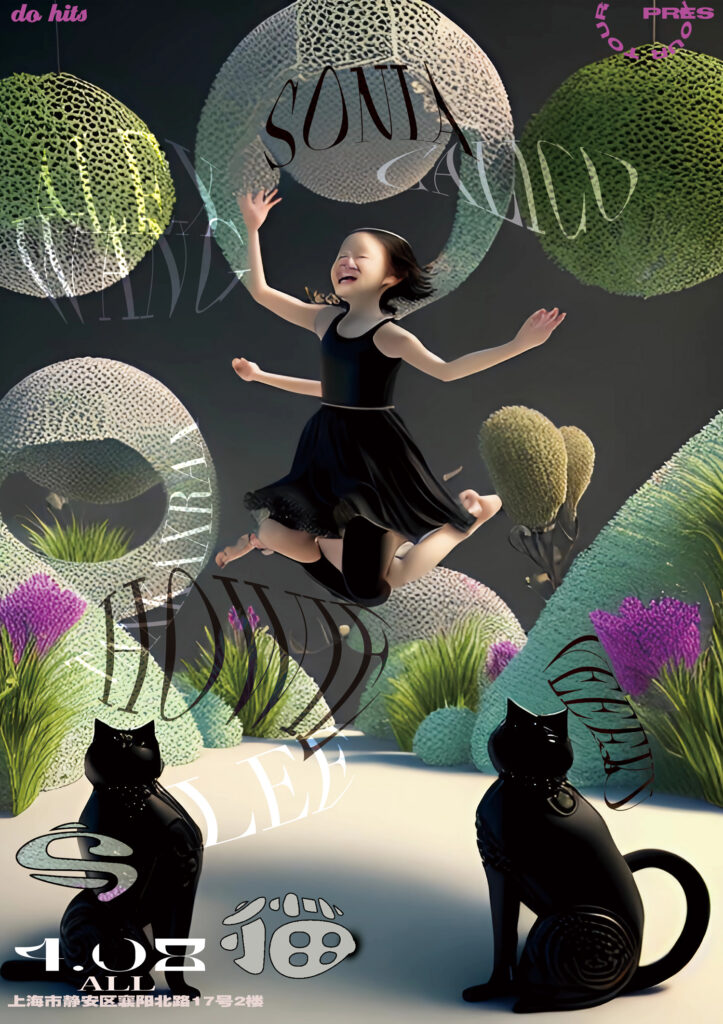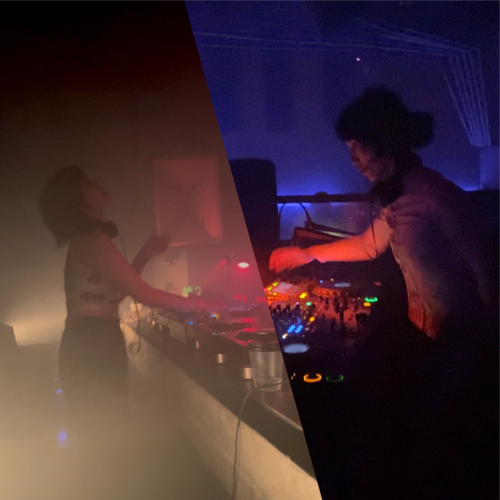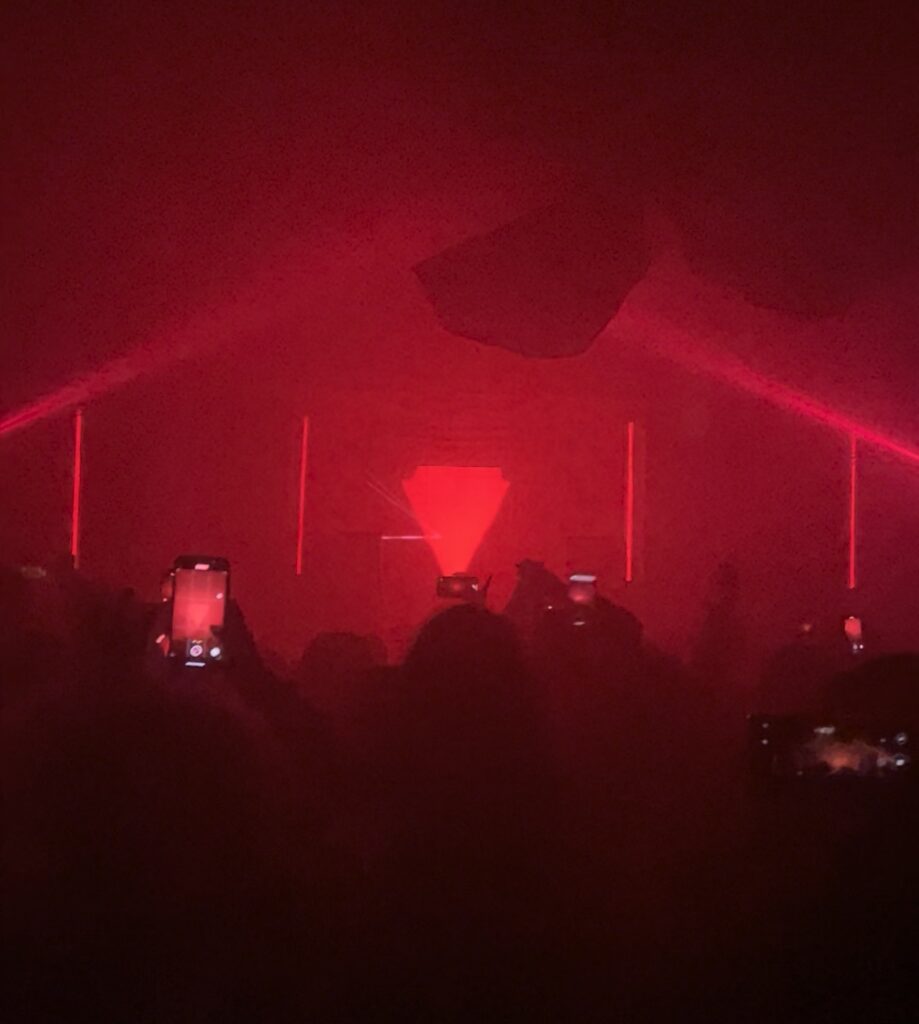Sonia Calico and veeeky, two acclaimed musicians often referred to as "soul sisters," have played integral roles in shaping Taipei's contemporary electronic music scene. From their involvement in the underground community and venues like Korner, to forming the DJ duo Bounce Girlz and co-founding the label UnderU, their collaboration extends to various musical and visual endeavors. Recently, Sonia Calico enlisted veeeky's talents for mind-bending 3D music videos for singles such as "Desert Trance" and "Change, Reset ft. PRINCI." The duo also delivered a mesmerizing audiovisual performance titled "SYNERGY TRIANGLE" with Abao at SYNERGY FESTIVAL.
The "Black Cat," tour not only marks the first group of Taiwanese electronic musicians to perform across China from south to north after the pandemic but also reunites Sonia Calico and veeeky as DJs after years of collaboration. This spectacle evokes shared memories among dance enthusiasts and musicians who experienced Taipei's electronic music scene during its formative years.

—During the tour in China, did you notice any differences compared to the electronic music scene in Taiwan, such as the audience, hardware/software, societal acceptance, and even funding sources?
Sonia Calico:
This time, after a three-year gap, I was lucky enough to have the opportunity to explore several cities that I hadn't visited before. Each city felt distinct, from the venues, sound systems, appearance and reactions of the audience, preferred music styles, and even the time people showed up at clubs.
Axis in Chengdu and ALL in Shanghai had top-of-the-line equipment with CDJ 3000 and DJM V10. On the night of our performance in Shanghai, I heard that there were many other major club events happening simultaneously. Despite this, everyone eventually gathered at ALL.
The bass sound at Loopy in Hangzou was intense, igniting excitement both inside and outside the venue. Before performing at Dada in Kunming, the people inside didn't quite resemble the usual partygoers I'd encounter. I wasn't sure if they were just there for drinks, but once I started playing, they all crowded the dance floor, disregarding who we were and dancing wildly. It was unexpectedly fun.
The owners of Pools in Dali are s group of 3 sibling-like friends who grew up together, fulfilling their dream of opening a venue with immense passion. Oil in Shenzhen, on the other hand, would explode with excitement every time there was a drop. The audience there was adorable. In Beijing, we encountered a sandstorm. The venue where we were supposed to perform, Groundless Factory, was difficult to breathe in due to the dust, and there was a layer of soil on the equipment. However, the audience wasn't affected by these conditions at all. The more challenging the environment, the more it fueled their desire to dance.
Each place has its unique story, and there's never enough time to share them all. However, I must admit that during this tour, regardless of the city, the venue owners, promoters, local DJ friends, and others showed great passion and love for this culture. They work hard to build their local scenes. I'm thrilled to have shared so much with the friends I met along the way. It broadened my horizons and sparked even more curiosity about them. I hope to have more opportunities to spend more time and truly experience them, which would undoubtedly lead to more insights to share.
veeeky:
Each city's music scene, atmosphere, and way of life differ significantly. Some places have more resources and conditions to host international artists, which brings a more open-minded approach and diverse forms of expression. It also tends to be more dynamic and commercially mature. On the other hand, certain places focus more on local and grassroots cultivation, gradually creating their own club music and scenes. These two aspects are not mutually exclusive.
Overall, the experience has fed various needs, and the audience appears open-minded and curious. Venue owners or event organizers, perhaps due to the need to adapt their business models after the pandemic, are willing to allocate resources in different ways. This allows even niche music scenes to be relatively accessible to many people.
—What is the origin of the name "Black Cat"?
The name comes from an old song, "Black Cats March," sung by Taiwanese singer Tshiu Siâm in 1929. In the local dialect, "black cat" refers to fashionable women who hang out in the streets with positive connotations. There's also a catchy children's song called "Black Cat" that mentions eating cookies with coffee, which sounds like something we do every day.
—To seamlessly connect with the audience in China and effectively promote music and events, any suggested approaches for utilizing localized communication and strategic use of social media?
Sonia Calico:
I don't usually use WeChat or Weibo much, but for effective communication, it's essential to utilize these social media platforms and music streaming services like NetEase Cloud Music. Take the time to research if your music is properly available on these platforms and read the comments from listeners. It can be quite interesting. Another suggestion is to chat with as many people as possible and listen to what they're working on. China is vast, with a large population and a continuous influx of events. This will motivate you to strive for improvement and provide the drive to plan and execute projects beyond what you're currently doing.
veeeky:
As Sonia mentioned, the use of different social platforms in China requires adapting to local methods for publishing information or content. Additionally, local party organizers establish communities within WeChat, which fosters more intimate communication and allows people to connect on a deeper level. If you want to communicate or perform, each city has its own party organizers and musicians. Networking with the right people is a more solid approach.

—Did you encounter any interesting Chinese musicians or party organizations during this tour?
Sonia Calico:
There were so many. In Shanghai, we met the people from BAIHUI Radio, including Knopha, whom we had met during our previous tour. This time, we also met the other founder, Slowcook. The day after our performance in Shanghai, we visited their new venue.
The new BAIHUI is located in the central basement of a trendy department store. Apparently, they managed to secure this floor during its redevelopment. On the same floor, there are many Chinese designer brands and artwork from local artists. BAIHUI Radio broadcasts live from there. It's truly amazing that such a prime location is used for an electronic music radio station. In Guiyang, the owner of Local, ras, is a DJ who has a deep love for Taiwanese hip-hop and even sells spicy chicken as a side gig.
In Shanghai and Hangzhou, we met Alex Wang, whom we always knew as part of the Do Hits family, but this was the first time I met him in person. He has a VR headset, a gaming racing seat, and a sphynx cat at home.
In Beijing, a week before our performance at Groundless Factory, there was a grand ballroom event for the LGBTQ+ community. The venue was plastered with posters, and a giant flower installation remained in the center of the dance floor, yet to be dismantled. I heard that the event lasted from 2 PM until 7 AM the next day. It seemed like a lot of fun, and I noticed that LGBTQ+ events are thriving in China as well. Hopefully I could participate or even join the lineup next time.
veeeky:
This tour marked the first consecutive performances after the pandemic, allowing us to strongly feel the seasonal vibes. Each city was blossoming with spring, and the streets were filled with more people. Besides reuniting with good friends I hadn't seen in a long time, I also met many artists in each city. These individuals are passionately working within their respective fields, which is highly inspiring.
In Beijing, we held an event at Groundless Factory for the first time. It was open even during the pandemic and said to be the only venue standing strong. It's a vast factory space with little decoration, and the sound system doesn't meet club standards. However, there's a rawness to it, and you can sense its directness and vitality.
—What are your plans for this year?
Sonia Calico:
I'm currently in discussions with a music label and plan to release some EPs this year. Additionally, I'm participating in a residency program at the New Taipei City Art Museum, where I'm trying to create a ceramic instrument. It should be unveiled around July. There are also ongoing projects, but I'll announce them when the time is right.
veeeky:
I'm working on new visual projects, experimenting with AI and algorithms to guide the development of agricultural products and specimens. The story will likely be set in 19th to 20th-century Taiwan. If all goes well, there will be an exhibition. On the other hand, there may be also some new collaborations in non-art spaces.






